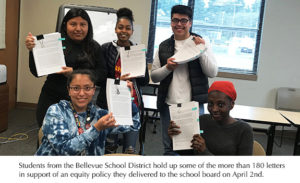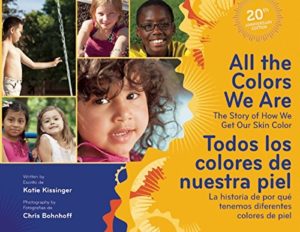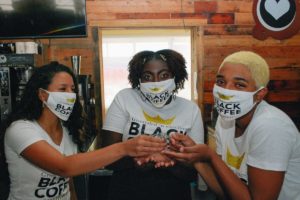The Kenmore Elementary Parent Teacher Association (KEPTA) does not assume any responsibility or liability for the content that may be present within external Websites linked to and from this site that are operated or created by or for organizations outside of KEPTA. The linking to or from this site does not imply on the part of KEPTA or any of its volunteers guarantee of quality, assumption of liability or endorsement of the organizations maintaining external Websites. Those organizations are solely responsible for the operation of their Website and quality of the content including advertisements, links, media, images and text that they may deem appropriate. The mention of any business or service in this website does not imply endorsement by KEPTA.
Welcome to our KEPTA REJ Connections Page! Each month our REJ committee will provide our Kenmore Cub community with family read alouds, activities, short videos and resources to assist our community growth in racial literacy, cultural competency and equitable education. We hope these monthly resources will inspire courageous conversations about racial injustice, equity and youth activism in our homes. We are KENMORE–nurturing brave, inclusive, and empathetic children alongside one another!
ANTI-RACIST COLLABORATIONS IN EDUCATION
Anti-Racist Collaborations in Education is about how we can take the work off the page, moving beyond theory and dialogue. Anti-racist collaborators move through these collaborations as co-conspirators.
Concepts that are key to understanding what this type of collaboration entails, includes: critical self-reflection, solidarity, mutual aid in educational settings and advocacy that is non-tokenizing. This means, we must reflect on our own identity and positionality so that we do not just assume what a particular family, group, or community needs. We must also consider our power, what we can give up, and whose voices should be amplified.
In schools, this can promote a culture of shared responsibility, building relationships and capacity of all stakeholders; promoting leadership in non-dominant parents so they can help shape the agenda, and addresses broader issues in the community. (Ishimaru)
-Melissa Riley, Assistant Director of Equity Pedagogy, Northshore School District
-Ayva Thomas, Assistant Director of Racial and Educational Justice
-Ranna Harb, Racial and Educational Justice Specialist
To be anti-racist collaborators in education, we must treat the school as part of the community, not separate from it, in order to promote accountability and momentum. Furthermore, recognizing leadership in all community members and trusting that people who look, speak, or live differently than we do have the needed expertise in areas (culture, compassion, empathy, life experiences) that will only enrich the lives of our students and foster educational justice in our community.To do this, NSD’s Ayva Thomas explains, we must shift our perspective of power from one of “hierarchical power structures to horizontal political power…[so that] the value and credibility of people is not determined by Eurocentric standards of success, but by their authentic humanness and inherent worth.”
FAMILY RESOURCES
Children’s Book Read Alouds (K-5)
All The Colors We Are; Todos los Colores de Nuestra Piel (bilingual) by Katie Kissenger and photography by Chris Bohnhoff, read in English and Spanish by Ms. Paula Liz, is a bilingual (English/Spanish) book that simply explains the three ways we get our skin color (genetics, melanin, the sun) and emphasizes that our skin color is just one “of the many ways people are special and different from each other.” The end of the book includes a couple of follow-up activities.
Not My Idea: A Book About Whiteness by Anastasia Higginbotham is a picture book about racism and racial justice, inviting white children and parents to become curious about racism, accept that it’s real, and cultivate justice.
Watch

Image Credit: PBSLearningMedia.org
PBS Kids Talk Race & Racism (28 minutes) – Hosted by Amanda Gorman, this is a great resource for kids school ages K-5 on talking about race and what to do when you see people being treated unfairly.
Barbie and Nikki Discuss Racism (2 minutes) – Barbie and her friend Nikki have a conversation about racism. Watch the video with your kids and see what conversations come up. Discussion: If Nikki told Barbie what happened to her while they were on the boardwalk, what actions could Barbie have taken to stand up for her friend?
Family Activity
Understanding Prejudice Through Paper Plate Portraits (K-5)
Building off of “All The Colors We Are” try this activity on perspective: Create a “paper plate portrait” to encourage your child to reflect on prejudice, revealing why it is important that we all challenge biased assumptions, which can spark conversations about anti-racist collaboration in your community. This activity also helps kids see how multifaceted they are as individuals (thinking about their “outside” versus “inside” selves). Using a paper plate, have your child:
- Draw a portrait of themselves on the back of the plate, leaving some room around the border for words describing statements or observations that others would have about them just by looking at them from the outside.
- Turn the plate over, draw a large heart (optional) and fill it in with words that describe who they truly are on the inside or what others wouldn’t know just by looking at them.
- Have a conversation about how their “outside” view does or does not reflect who they are on the “inside”, and their power to develop their identity based on how they see themselves, rather than how others see them.
Kenmore Cub Example:
ADULT RESOURCES
Article
Authentic White Antiracist Praxis in Education Today by Northshore District’s REJ team member Ayva Thomas
Watch (5 min)
EduTalks 2020 – Families as fellow leaders on the journey to educational justice
Dr. Ann Ishimaru, associate professor at University of Washington, explains how addressing persistent racial inequities in education can be achieved by creating more equitable forms of collaboration among non-dominant families, communities and schools.
Book
Just Schools Building Equitable Collaborations with Families and Communities by Dr. Ann Ishimaru, 2019

Image Credit: Amazon; Teachers College Press, 2020
Podcast (29 min)
National PTA Notes From The Backpack Podcast – Raising Kids Who Embrace Race

A PTA Podcast from National PTA Image Credit: PTA.org
Activity
Calculate Your Privilege – an exercise based on Peggy McIntosh’s “White Privilege: Unpacking The Invisible Knapsack”. Jump to Page 9 to complete the survey to calculate your % of privilege based on your race OR try this shorter Privilege Points Questionnaire.
This activity is designed to help you develop an understanding of White Privilege on a personal level, and in understanding how racism and privilege operate, and how their collective experiences are related to institutional White supremacy in the United States. Given our history as a country, we cannot talk about racism without understanding Whiteness. This is a good place to start. Click here for other privilege checklists (ex. able-bodied, gender, sexuality, religion).
Social Media
Join the FaceBook group White People Doing Something and check out their 5-day challenge to learn how to make a real impact on social justice, or just even how to build skills on having hard conversations.
Email subscription
Anti-racism Daily – receive daily or weekly emails on current events with an anti-racist lens.
Community Hub/Student Support
Black Coffee Northwest Café and Community Hub is a locally owned Black business. Through thoughtful programming, they bring the community together for networking and collaboration while providing work experience for Black youth in Shoreline.
Anti-racism around the world
See how other countries (UK, Scotland) are addressing anti-racism in education and view their list of resources.
Spotlight on Education:

Students from the Bellevue School District hold up some of the more than 180 letters in support of an equity policy they delivered to the school board on April 2nd. Image Credit: NEAEdjustice.org
Local Educators, Parents, and Students mobilize in support of district equity policy – from the National Education Association (NEA), this page includes a resource guide on Racial Justice in Education, how to create a safe space to talk about race in school, and stories from local anti-racist White educators in Bellevue.
Other anti-racist educator resources:
- Learning For Justice – Anti-bias Education: Family & Community Engagement professional development framework to develop strategies to tap into family and community wisdom.
- Article on Becoming Upended: Teaching and Learning about Race and Racism with Young Children and Their Families
- Speaking Up At School document – Learning for Justice (previously Teaching Tolerance)
- Teaching While White website/resources – More than 80% of teachers in the U.S. are white. But most don’t know that their whiteness matters. Teaching While White (TWW) seeks to move the conversation forward on how to be consciously, intentionally, anti-racist in the classroom.
- Sign Up for Northshore District’s Racial & Educational Justice monthly newsletter for district led resources (scroll to the bottom of the page to sign up)


